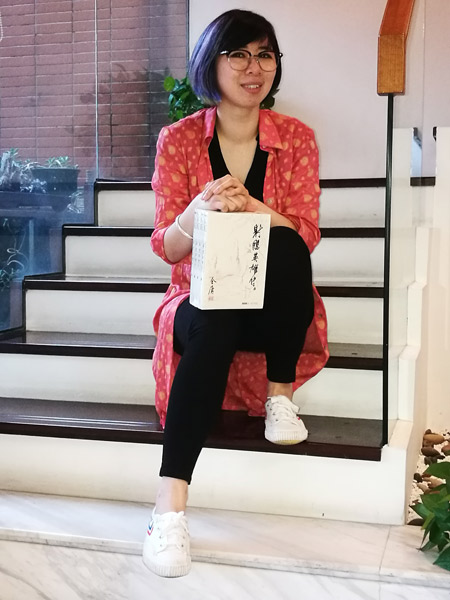Turning action into words
By Mei Jia | China Daily | Updated: 2019-04-19 08:42

Chang says she worked very hard on two paragraphs to balance "an I Ching quote, a discussion of a fictional movement and its abstract energy flow, and making it sound like someone would say it out loud".
I Ching, also known as the Book of Changes, is an ancient Chinese classic.
Many phrases are at the very foundation of Chinese thinking and philosophy. They're canonical texts that everyone knows and scholars spend lifetimes studying and researching, she says.
And while in cinematic language, it's easier to picture multiple actors with fast-moving scenes, for Chang, "moments like that make me clutch my head in despair" if one wishes to keep the writing light and fast and not get weighed down by too many details. Such paragraphs meant Chang would have to rewrite many times, like a blacksmith forging iron.
"But when I finally work out a solution, the satisfaction is immense," she says.
Literary critic and writer Will Harris writes on Books and Bao, a translated-literature website, that, "in this second book, there is an escalation in the campy spectacle of the story and the action". Harris also notes that those with little knowledge of, and experience with, Chinese culture and history will find no difficulty diving into the books.
"Having such a groundbreaking Chinese epic in English is a real gift to fantasy literature," he adds.
Chang was born in Hong Kong in the 1980s, where Jin Yong was like the air everyone breathes. "His stories were everywhere: on TV, in the cinema, on everyone's lips," she says.
While growing up, she was swept up by the adventure the TV series, based on the books, brought.
"I'm really honored and excited, and intimidated, too," she says of the chance to translate her icon's writing.
Chang got to know Holmwood when working at the Victoria and Albert Museum. There, Chang assisted exhibitions from China and translated for the audience, after graduating with a degree in art history from University College London. She then worked in art troupes in Hong Kong and translated classical Chinese dramas for the Royal Shakespeare Company.
She is now working on Volume 4 of the Condor Heroes series, while Holmwood is on the third.
Both translators have worked toward the common goal of publishing four volumes quickly, yet with a unified voice. UK-based MacLehose Press will publish the translated series.
"The joy of the translation process is that it's a journey of discovery of languages and cultures, and it helps in sharing knowledge, building understanding, creating interest in things," Chang says.
In addition, working in a bilingual context gives her the opportunity to see the foreign interest in China and its culture, she says.
Contact the writer at meijia@chinadaily.com.cn
























